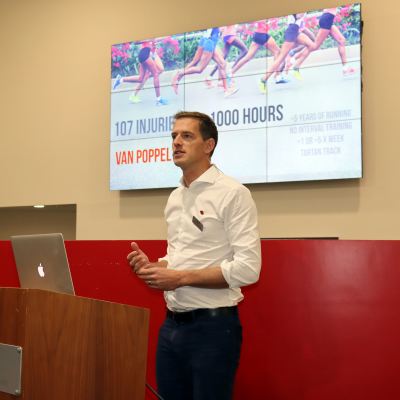 Listen to Dr Andy Franklyn-Miller, Consultant Sports & Exercise Medicine Physician and Director of SSC Sports Medicine as he discusses Body Composition and the benefits of SSC’s Health Lab Services with Clare McKenna on Newstalk’s ‘Alive and Kicking’ podcast.
Listen to Dr Andy Franklyn-Miller, Consultant Sports & Exercise Medicine Physician and Director of SSC Sports Medicine as he discusses Body Composition and the benefits of SSC’s Health Lab Services with Clare McKenna on Newstalk’s ‘Alive and Kicking’ podcast.
| For further information on Health Lab Services at UPMC Sports Surgery Clinic please contact sportsmedicine@sportssurgeryclinic.com or phone +353 1 5262030 |
I am here with Dr Andy Franklyn-Miller and we are having a look at my results, but before we get into that can you just remind us of the health scan and the programme, and what I went through and why?
Health Lab has really been designed to look at health all round, to give a snapshot of stress and how the body is handling both diet, exercise, work stress and particularly at the moment in this very strange and unique time, how the body is reacting to these extra stresses of the environment that we have been put under, so it’s about the tests: both patient questionnaires, understanding how you view various parts of your health, dietary understandings (some blood tests) and a body composition scan; looking at how body fat is distributed between the central organs like the liver and inside the abdomen, but also around the outside of muscles, and also stress heart rate variability as a marker of exercise and how you are getting on with sleep and life in general.
We compare and contrast how that changes over time and then look for any warning signs of possible potential health issues in the future, but also try to optimize things for you, so rather waiting for things to happen, what we might be able to change in a positive way to give you more energy, better sleep, better lifestyle and then reduce some of those risk factors for diseases of high glucose and high-stress levels.
One of the focuses was on body fat, and where your body fat percentage is in your body composition. Now I know we’re all focused on the aesthetic and that’s a different story (wanting to look lean), but why is our body fat percentage an indicator of where we are health-wise?
One thing that we forget quite often is that body fat is we can see it distributed around ourselves around our tummy, our back, our chest but also our organs. The bits of us that deliver vital functions can also accumulate fat and one of the big health risks here is fat deposits in the liver because it stops the liver being able to function, to break down products and waste and is one of those early signs of disease.
So whilst looking at how you look and taking callipers of how much body fat you have around the outside of you, a body composition scan can look at how much is internal and external so you get some early warnings of those organs that might be struggling as well.
You have come under some criticism over time that looking at lifestyle will never replace medication and you are not suggesting that people stop taking pills if they need them but it is very important that we have a picture of our general overall health and lifestyle changes we can make to affect this?
Absolutely and look, we know that morbidity or risks to health from inactivity and poor diet really are an enormous problem for public health around the world. We are getting older as a population, we are also getting fatter and less active over time and of course, that’s not everybody. There are some people who are incredibly active, lead very healthy and very focused lives, but not most of us and there is an ever-increasing reliance on more and more medication to try to treat these conditions.
What we are really trying to say here is that there are some scenarios where changes to lifestyle, diet exercise are of enormous benefit and there has been a lot of work gone into how we might use that. Do we need to call it lifestyle medicine? Of course, we don’t. We can call it ‘Exercise and Health’ and we can look at those risk factors. What we are really saying is let’s look at our health, let’s look at how we can improve our lifestyle while we still can rather than waiting for these diseases take effect. What we are really saying is let’s look at our health- let’s look for area’s where we can improve our lifestyle- when we still can rather than waiting for those disease processes to take effect.
So a reminder; I had the body fat composition, the DEXA scan back at the end of January, my bloods, my heart monitor and then I headed off with a programme and an idea of what to do and here I am. Obviously we were a little delayed with the global pandemic, but nonetheless I have carried on and remained focused, so how did I get on after my DEXA scan last week?
As you can see from your numbers here you have done ok. Across the 7 months, you have decreased your body fat by about 1 or 2 per cent.
You have got lighter, you have lost nearly 2 kilograms in weight. You can see that all of your fat loss has been 1 and a half kilograms, you have gained a little bit of lean muscle mass so some of the gym training you have been doing has increased that muscle mass and you can see that sometimes bodyweight itself isn’t the best indicator of actually you losing fat but we can see when looking at the distribution you have lost fat both on your internal organs and around the trunk, maybe less so on the arms and legs but that is normal in terms of that process.
But overall you have probably lost less than we would have expected after focusing on lifestyle change and exercise and you have been working really hard in terms of that process and so I guess it probably starts to raise the question that we need to look at some of the reasons that may not be the case.
I thought this was interesting because I couldn’t fully work out the numbers but a lot of it is graphs so I could tell it hadn’t gone down that much. Now I hadn’t lived in deprivation mode or anything like that, I have lived normally as per the advice of Daniel Davy, the Performance Nutritionist. I stuck to what he said, was consistent with my exercise, so also I expected to see more. But you think it’s less about that and more about my bloods that’s what gives you an indicator about what is going on?
Absolutely, we know from looking at your heart rate variability and activity monitoring that you have actually increased the amount of activity you were doing, therefore, you have increased the amount of energy/calories you are expending.
You have been careful, had a balanced diet, but you have not really been excluding any specific foodstuffs.
When we looked at your bloods, your blood glucose is normal and so therefore from a normal set of bloods we expect nothing to see.
What is interesting to look at is insulin sensitivity. What that really means is how your body reacts to surges in glucose- it produces insulin to mop up the excess that you don’t need.
We can see from your HOMA-IR (a measure of simply comparing the ratio of glucose to insulin sensitivity) that actually you are struggling a little bit in order to produce enough insulin to cope with those increased glucose levels.
We see that that progresses to and there is some good research demonstrated that this leads to increased risk, particularly in female patients, of developing type 2 diabetes or insulin resistance. And that certainly can explain why it is more difficult to lose body fat if you are struggling to control circulating excess of glucose in the body.
So if you are somebody who has this sensitivity what is the best way to get this under control?
Well for those patients who have been diagnosed with type 2 diabetes and that’s not where you are at and does not necessarily mean you will get to that level, but in those patients, we often say that lifestyle changes are the first step.
What does this really mean? Dietary manipulation is certainly a part of that and one of the easiest things to do is to control or restrict the amount of glucose that we eat. The easiest way to do that is to control the amount of carbohydrate. Does that mean we have to be extreme and go for a sort of carnivore only diet? No, it doesn’t, but certainly significantly reducing the number of carbohydrates has been seen to improve the amount of glucose circulating in the body.
Some increasing interest in 24 hour live monitoring of glucose through a skin sensor that can measure both glucose levels continuously, in the same way that many diabetics will do in order to measure the amount of insulin they were giving and that would be a type 1 diabetic who doesn’t produce insulin normally, rather than a type 2 diabetes which is more control issue with the response of insulin. By measuring glucose over 24 hours we can get an idea of which bits of food or diet in meals that you have that cause significant spikes, and that is different for everyone
We are understanding more about how you adapt to metabolise food and so for some people eating a bowl of porridge might be an excellent way of giving a sustainable low level of glucose, but for many others it might give a significant spike of glucose that the body has to work quite hard to absorb, and therefore can easily lead to excess.
So what might be perfect nutrition in terms of a balanced diet for one person might well cause significant glucose spikes for another and then lead to high circulating levels of glucose. Controlling diet, looking at the circulating levels of glucose and reducing levels of carbohydrates is certainly step 1 in this, in combination with looking at an exercise programme and making sure that it’s a progressive increase rather than just staying the same with what you might be doing.
It is interesting what you say about everyone being different and yet across the board we are seeing an increase in diabetes and type 2 diabetes. What is causing the health pandemic? Is it because we are living in a world of plenty so we just eat too much is that the bottom line?
Well on a simple level people would say this is about calories in and calories out, so how many calories you burn and trying to balance that with the amount of food that you eat. But it’s really not as simple as that because although a steak and a banana might have been matched in terms of calories if we balance them up specifically, obviously they are very different in what the body does to metabolise them.
A steaks protein will take longer to metabolise, very unlikely to see that spike of sugar, whereas fruit can be broken down much more easily which can cause a big spike. So it’s not as simple as calories in, calories out. Really I think that a lot of it’s about convenient food; people live busy lives, a lot of processed food is high in carbohydrate because we feel full quickly. Elite athletes are no different, often we see athletes who will go for a fast sustainable carbohydrate source immediately after but equally think nothing of grabbing a bag of Haribo’s after training because they are feeling very tired as they’re blood sugars are low.
The exact same thing happens to them, just that their overall work load/energy expenditure is so significantly higher they can often get away with it on the odd occasion whereas many of us with a lower level of exercise don’t get away with it.
So where does this leave me? My initial goal was to try and prove that it’s actually relatively simple to be healthy and through the experts I have worked with they have given me a lot of information on the emotional side of why we eat what we eat and why we may go off track of our health which adds a layer of complexity. But this also adds a layer of complexity; that everybody’s different and it could be something to do with your processes within your body. But is the bottom line still that it’s quite a simple lifestyle and dietary change to fix it. Is it still simple underneath?
I think it is still simple. I think what we have identified in your case is that there might be a reason why it is a little bit harder than it is for someone who is exactly the same otherwise in how they approach life to you. You may have taken on the same challenge but have lost more body fat or may have not lost as much body fat and you have been successful in many ways in this process. But in your case we have identified that actually your control of glucose is a bit harder, and so therefore you need a bit more help in terms of getting that right, but once that balance is there and we get an idea of what you need to do, but if that will work for you and so then it is very much self-managed and I think there is more to it than just looking at body composition, because your liver enzymes are very normal, your vitamin D is gone back up into the normal range which is very important at the moment in terms of immune function and there’s a lot of positives here as well as identifying an area where might need a bit more focus.
So what is your advice to everybody? Find out the info, find out what’s going on in your body particularly if you have an indicator whether it’s poor sleep, poor energy levels or you feel overweight and sluggish- find out what is going on within.
There is always an answer here. So for many people, restricting carbohydrates they are likely to see almost immediate results such as losing body weight, feeling more energised, improving sleep. But if it is not working for you then that may be the time at which there is a need to look at it a bit more in depth and understanding perhaps potentially insulin sensitivity is one way at looking at that glucose control, looking at body composition is a way of understanding where that body fat is distributed and then some other information markers and liver function can give us some early ideas about what’s going on as part of the overall picture. You mentioned it earlier on stress, lifestyle, sleep are incredibly important components of this. It can be that actually stress and sleep are the main problem here and we know in your case that this is very well managed but not always in many people there are different areas of focus for people who are struggling one way or the other and it is not one size fits all.
| For further information on Health Lab Services at UPMC Sports Surgery Clinic please call +353 1 5262050 or email healthlab@sportssurgeryclinic.com |










